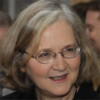Elizabeth Blackburn

Elizabeth Blackburn
Elizabeth Helen Blackburn, AC, FRS, FAA, FRSNis an Australian-American Nobel laureate who is currently the President of the Salk Institute for Biological Studies. Previously she was a biological researcher at the University of California, San Francisco, who studied the telomere, a structure at the end of chromosomes that protects the chromosome. Blackburn co-discovered telomerase, the enzyme that replenishes the telomere. For this work, she was awarded the 2009 Nobel Prize in Physiology or Medicine, sharing it with Carol W. Greider...
NationalityAustralian
ProfessionScientist
Date of Birth26 November 1948
CityHobart, Australia
CountryAustralia
I was born in the small city of Hobart in Tasmania, Australia, in 1948. My parents were family physicians. My grandfather and great grandfather on my mother's side were geologists.
Researchers have found that the brain definitely sends nerves directly to organs of the immune system and not just to the heart and the lower gut. In that way, too, the brain is influencing the body.
We're involved in a very large study that's federally funded and being done with Kaiser Permanente, and saliva is a very non-invasive way to get cells from the body.
Observational studies show that exercise, nutritional supplements and reducing psychological stress can help. Chronic high stress and smoking can lead to accelerated telomere shortening.
Medicine has been successful by treating diseases in a very specific way once the damage is done. But telomere length integrates a lot of factors together and gives you an overall picture of risk for what is now emerging as a lot of diseases that tend to occur together, such as diabetes and heart disease.
No one ever said, 'Be a doctor.' But because so many members of my extended family - aunts, uncles - were doctors, there was this expectation that I'd probably be a physician.
When you bring telomerase RNA levels down by using a mechanism that targets the RNA for destruction, the cells which were running on very high telomerase levels are now running on a lean diet of telomerase.
I spent my first 4 years living in the tiny town of Snug, by the sea near Hobart. Curious about animals, I would pick up ants in our backyard and jellyfish on the beach.
Telomeres are the protective caps at the ends of chromosomes in cells. Chromosomes carry the genetic information. Telomeres are buffers. They are like the tips of shoelaces. If you lose the tips, the ends start fraying.
Studying organisms at a molecular level was totally compelling because it was moving from being a naturalist, which was the 19th-century kind of science, to being very focused and really getting to the heart of these molecules.
One characteristic aspect of ageing is the increased susceptibility to disease, particularly age-related diseases such as cardiovascular diseases and cancer.
In the 1970s, I did a Ph.D. with Fred Sanger in Cambridge who was in the process of inventing ways to map what's inside DNA. He later won the Nobel Prize.
In my lab, we're finding that psychological stress actually ages cells, which can be seen when you measure the wearing down of the tips of the chromosomes, those telomeres.
Generally, we try to have a situation where the person is healthy, so you're not confounded by disease. So, that means that healthy individuals are donating their blood samples for the studies.